“Just sit right back and you’ll hear a tale, the tale of a fateful trip…”
Of all the TV theme songs that have come and gone over the decades, probably none has been so ingrained into our minds as the theme to “Gilligan’s Island.” The show lasted only three seasons (1964-1967), but the combined music and lyrics created an insidious “ear worm” that burrowed its way permanently into the subconscious of anyone who grew up in the ’60s, and even some in the ’70s and ’80s as well.
And there were others. The ’60s and ’70s were full of programs with theme songs with 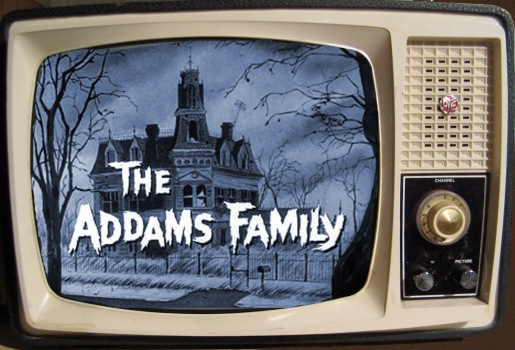 lyrics that basically explained the shows’ premise in a catchy, sing-songy way: “Petticoat Junction” (1963-1970), “The Patty Duke Show” (1963-1966), “Green Acres” (1965-1971), “Flipper” (1964-1967), “The Brady Bunch” (1969-1974), “Mister Ed” (1961-1966), “The Addams Family” (1964-1966), “F Troop” (1965-1967), “The Mary Tyler Moore Show” (1970-1977), “All in the Family” (1971-1979), “The Jeffersons” (1975-1985).
lyrics that basically explained the shows’ premise in a catchy, sing-songy way: “Petticoat Junction” (1963-1970), “The Patty Duke Show” (1963-1966), “Green Acres” (1965-1971), “Flipper” (1964-1967), “The Brady Bunch” (1969-1974), “Mister Ed” (1961-1966), “The Addams Family” (1964-1966), “F Troop” (1965-1967), “The Mary Tyler Moore Show” (1970-1977), “All in the Family” (1971-1979), “The Jeffersons” (1975-1985).
Yet none of these songs ever proved popular enough to be played ad infinitum on the radio, but then again, they weren’t really meant for that. Other theme songs, on the other hand, turned out to be far more suitable as Top 40 hits, sometimes because they were intended as such, more often not.
Most involved lyrics, but a select few instrumental pieces also made the charts. I’ve chosen 15 TV theme songs of the ’60s, ’70s and ’80s that I found either appealing to me or noteworthy enough to examine in more detail. As I often do, I add a list of “honorable mentions at the end, followed by a Spotify playlist.
If you watched as much TV as I did back then, you I think you’ll find this musical trip very entertaining.
And here we go:
“Happy Days”
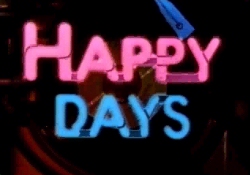 When the “Happy Days” sitcom debuted in early 1974 as TV’s answer to the film “American Graffiti,” the show used Bill Haley and The Comets’ 1955 classic “Rock Around the Clock” as its opening theme song. Over the closing credits was an early version of “Happy Days,” written by Norman Gimbel and Charles Fox, and sung by Jim Haas. By Season 3, the song was re-recorded with different lyrics by the team of Pratt & McClain, and used in both the opening and closing credits for the remaining seven seasons of the show’s run. When it was released as a single in 1976, it reached #5 on the Top 40 charts.
When the “Happy Days” sitcom debuted in early 1974 as TV’s answer to the film “American Graffiti,” the show used Bill Haley and The Comets’ 1955 classic “Rock Around the Clock” as its opening theme song. Over the closing credits was an early version of “Happy Days,” written by Norman Gimbel and Charles Fox, and sung by Jim Haas. By Season 3, the song was re-recorded with different lyrics by the team of Pratt & McClain, and used in both the opening and closing credits for the remaining seven seasons of the show’s run. When it was released as a single in 1976, it reached #5 on the Top 40 charts.
“Secret Agent”
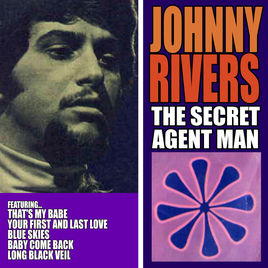 P.F. Sloan, a successful pop songwriter who wrote more than 20 hits for various ’60s artists like The Turtles (“You Baby”) and Barry McGuire (“Eve of Destruction”), came up with the iconic guitar lick that was selected for use on the American broadcast of the British spy show “Danger Man,” retitled “Secret Agent” by CBS. Initially, the producers wanted just a 20-second snippet for use in the show’s opening, but eventually Sloan and partner Steve Barri wrote the full length song entitled “Secret Agent Man.” Famed producer Lou Adler brought in Johnny Rivers, who’d already had four Top Ten hits by then, to record the song (with extra verses) live at the Whiskey A Go Go club on the Sunset Strip. That recording went to #3 on the Top 40 charts in 1966.
P.F. Sloan, a successful pop songwriter who wrote more than 20 hits for various ’60s artists like The Turtles (“You Baby”) and Barry McGuire (“Eve of Destruction”), came up with the iconic guitar lick that was selected for use on the American broadcast of the British spy show “Danger Man,” retitled “Secret Agent” by CBS. Initially, the producers wanted just a 20-second snippet for use in the show’s opening, but eventually Sloan and partner Steve Barri wrote the full length song entitled “Secret Agent Man.” Famed producer Lou Adler brought in Johnny Rivers, who’d already had four Top Ten hits by then, to record the song (with extra verses) live at the Whiskey A Go Go club on the Sunset Strip. That recording went to #3 on the Top 40 charts in 1966.
“Welcome Back, Kotter”
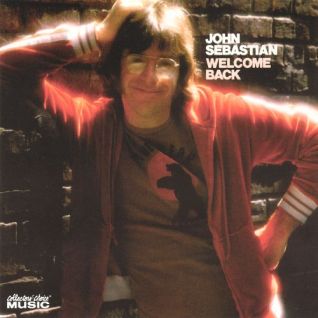 When producer Alan Sachs was putting together a Gabe Kaplan sitcom in 1975 to be titled “Kotter,” he wanted a theme song that sounded like one of his favorite ’60s pop groups, The Lovin’ Spoonful. As luck would have it, Sachs’s agent also represented former Lovin’ Spoonful singer-songwriter John Sebastian, and he brought the two together. Initially, Sebastian struggled trying to write lyrics that included the Kotter name, so instead he focused on the idea of the series’ premise of a teacher returning to the high school where he’d grown up. Sachs was so pleased with Sebastian’s song “Welcome Back” that he changed the show’s title to “Welcome Back, Kotter.” A scaled down version was used for the opening credits, but Sebastian’s full-length recording included two verses, a chorus, and a harmonica interlude, and that version reached #1 on the charts in May 1976 and eventually sold a million copies.
When producer Alan Sachs was putting together a Gabe Kaplan sitcom in 1975 to be titled “Kotter,” he wanted a theme song that sounded like one of his favorite ’60s pop groups, The Lovin’ Spoonful. As luck would have it, Sachs’s agent also represented former Lovin’ Spoonful singer-songwriter John Sebastian, and he brought the two together. Initially, Sebastian struggled trying to write lyrics that included the Kotter name, so instead he focused on the idea of the series’ premise of a teacher returning to the high school where he’d grown up. Sachs was so pleased with Sebastian’s song “Welcome Back” that he changed the show’s title to “Welcome Back, Kotter.” A scaled down version was used for the opening credits, but Sebastian’s full-length recording included two verses, a chorus, and a harmonica interlude, and that version reached #1 on the charts in May 1976 and eventually sold a million copies.
“The Monkees”
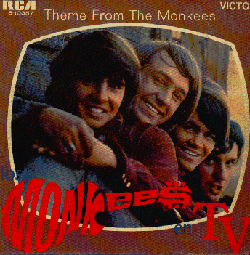 In 1966, producer Don Kirshner was tasked with the job of coming up with a TV series that mimicked the zaniness of The Beatles’ 1964 film “A Hard Day’s Night.” He held auditions and signed one true musician (guitarist Mike Nesmith), one struggling musician (bassist Peter Tork) and two actors who could sing (Davy Jones and Mickey Dolenz) to become The Monkees (derisively known as “the Prefab Four”). Kirshner employed staff songwriters Tommy Boyce and Bobby Hart to write not only the group’s infectious debut single “Last Train to Clarksville” but also “Theme From The Monkees,” which introduced each episode of the show, which ran for two seasons (1966-1968). Released as a single in early 1967, “Theme From The Monkees” reached the Top Ten in Mexico, Australia and Japan, but curiously, it didn’t chart in the US, pushed aside in favor of the enormous hit “I’m a Believer” and its follow-up, “A Little Bit Me, A Little Bit You.” Still, it gets a fair amount of radio play on oldies stations even today.
In 1966, producer Don Kirshner was tasked with the job of coming up with a TV series that mimicked the zaniness of The Beatles’ 1964 film “A Hard Day’s Night.” He held auditions and signed one true musician (guitarist Mike Nesmith), one struggling musician (bassist Peter Tork) and two actors who could sing (Davy Jones and Mickey Dolenz) to become The Monkees (derisively known as “the Prefab Four”). Kirshner employed staff songwriters Tommy Boyce and Bobby Hart to write not only the group’s infectious debut single “Last Train to Clarksville” but also “Theme From The Monkees,” which introduced each episode of the show, which ran for two seasons (1966-1968). Released as a single in early 1967, “Theme From The Monkees” reached the Top Ten in Mexico, Australia and Japan, but curiously, it didn’t chart in the US, pushed aside in favor of the enormous hit “I’m a Believer” and its follow-up, “A Little Bit Me, A Little Bit You.” Still, it gets a fair amount of radio play on oldies stations even today.
“Dr. Kildare”
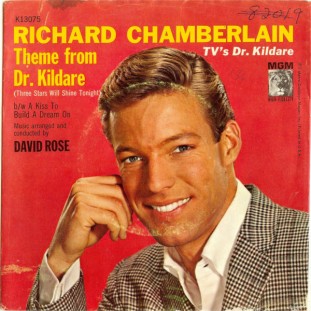 The fictional character Dr. James Kildare was created in the 1930s for a literary magazine, then made into a series of theatrical films in the 1940s, a radio program in the 1950s before becoming a Top Ten-rated TV show in the early 1960s. The instrumental theme music used for the series was written by Jerry Goldsmith. Although it was never heard as part of any “Dr. Kildare” episode, the theme music had lyrics and the parenthetical title “Three Stars Will Shine Tonight.” Actor Richard Chamberlain, who had a decent singing voice as well, took a shot at recording the full version and releasing it as a single, and lo and behold, it peaked at #10 on the Top 40 charts in 1962.
The fictional character Dr. James Kildare was created in the 1930s for a literary magazine, then made into a series of theatrical films in the 1940s, a radio program in the 1950s before becoming a Top Ten-rated TV show in the early 1960s. The instrumental theme music used for the series was written by Jerry Goldsmith. Although it was never heard as part of any “Dr. Kildare” episode, the theme music had lyrics and the parenthetical title “Three Stars Will Shine Tonight.” Actor Richard Chamberlain, who had a decent singing voice as well, took a shot at recording the full version and releasing it as a single, and lo and behold, it peaked at #10 on the Top 40 charts in 1962.
“Laverne & Shirley”
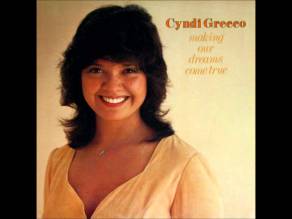 “Happy Days” proved to be so wildly popular that it successfully spun off another sitcom starring two supporting characters, Laverne DeFazio and Shirley Feeney, who became stars in their own right on “Laverne & Shirley.” A young lady named Cyndi Grecco was tapped to sing the theme song, “Making Our Dreams Come True,” written again by Normal Gimbel and Charles Fox, the same songwriting team behind the “Happy Days” hit tune. Grecco’s rendition reached #25 on the Top 40 charts in 1976.
“Happy Days” proved to be so wildly popular that it successfully spun off another sitcom starring two supporting characters, Laverne DeFazio and Shirley Feeney, who became stars in their own right on “Laverne & Shirley.” A young lady named Cyndi Grecco was tapped to sing the theme song, “Making Our Dreams Come True,” written again by Normal Gimbel and Charles Fox, the same songwriting team behind the “Happy Days” hit tune. Grecco’s rendition reached #25 on the Top 40 charts in 1976.
“Miami Vice”
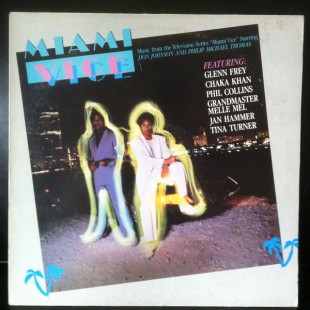 Jazz-rock keyboard virtuoso Jan Hammer came up with a catchy synthesized instrumental piece that swayed the producers of Miami Vice to make it their theme song beginning in autumn 1984. The show, which used a lot of rock music in its soundtrack, was conceived by NBC honcho Brendon Tartikoff in two words he wrote on a napkin one evening: “MTV Cops.” The original “Miami Vice” soundtrack LP, which included Glenn Frey’s #2 hit “You Belong to the City” as well as “Smuggler’s Blues,” was the #1 album in the country for six weeks in November/December of 1985. Hammer’s “Theme From Miami Vice” also topped the singles charts that year.
Jazz-rock keyboard virtuoso Jan Hammer came up with a catchy synthesized instrumental piece that swayed the producers of Miami Vice to make it their theme song beginning in autumn 1984. The show, which used a lot of rock music in its soundtrack, was conceived by NBC honcho Brendon Tartikoff in two words he wrote on a napkin one evening: “MTV Cops.” The original “Miami Vice” soundtrack LP, which included Glenn Frey’s #2 hit “You Belong to the City” as well as “Smuggler’s Blues,” was the #1 album in the country for six weeks in November/December of 1985. Hammer’s “Theme From Miami Vice” also topped the singles charts that year.
“Peter Gunn”
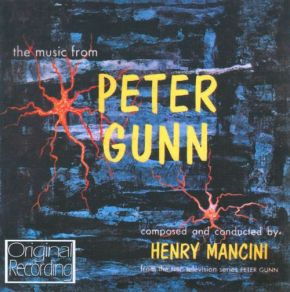 The original “night in the city” music, written by the great Henry Mancini. He said he was trying to evoke a mysterious “danger lurking” feeling that has been imitated hundreds of times since, most notably by John Barry when he wrote the James Bond Theme three years later that has been used in every Bond film since. Meanwhile, Ray Anthony and His Orchestra recorded a full-length version of the 45-second theme music used in the show (which ran from 1958-1961), and it ended up #8 on the Top 40 charts in 1959. Mancini’s original soundtrack album “The Music from Peter Gunn” won an Emmy for Album of the Year in 1959.
The original “night in the city” music, written by the great Henry Mancini. He said he was trying to evoke a mysterious “danger lurking” feeling that has been imitated hundreds of times since, most notably by John Barry when he wrote the James Bond Theme three years later that has been used in every Bond film since. Meanwhile, Ray Anthony and His Orchestra recorded a full-length version of the 45-second theme music used in the show (which ran from 1958-1961), and it ended up #8 on the Top 40 charts in 1959. Mancini’s original soundtrack album “The Music from Peter Gunn” won an Emmy for Album of the Year in 1959.
“Moonlighting”
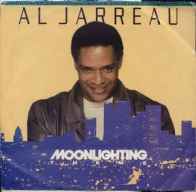 The punchy dialog and sexual chemistry between David Addison (Bruce Willis) and Maddie Hayes (Cybill Shepherd) made “Moonlighting” one of the most popular shows of the 1980s, although it lasted only four seasons (1985-1989). The Los Angeles locale required a jazzy, jet-setting theme song, and who better suited than singer Al Jarreau to co-write and perform it? His recording of “Moonlighting” reached #23 on the Top 40 charts in 1987.
The punchy dialog and sexual chemistry between David Addison (Bruce Willis) and Maddie Hayes (Cybill Shepherd) made “Moonlighting” one of the most popular shows of the 1980s, although it lasted only four seasons (1985-1989). The Los Angeles locale required a jazzy, jet-setting theme song, and who better suited than singer Al Jarreau to co-write and perform it? His recording of “Moonlighting” reached #23 on the Top 40 charts in 1987.
“Hawaii Five-0”
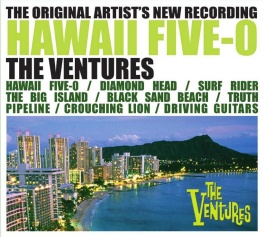 It’s no surprise the the producers of a detective show called “Hawaii Five-0” would want to use surf music as the basis for its theme song. Morton Stevens, a successful film and television score composer, wrote the instrumental music in 1968 for the show’s first season, played by the CBS Orchestra. It became so popular that it was soon re-recorded by the California pop group The Ventures and released as a single. It reached #4 on the Top 40 charts in early 1969. “Hawaii Five-0” lasted another 11 years (and was recently revived in a new prime-time version), so the theme music has become a dominant soundtrack in popular culture.
It’s no surprise the the producers of a detective show called “Hawaii Five-0” would want to use surf music as the basis for its theme song. Morton Stevens, a successful film and television score composer, wrote the instrumental music in 1968 for the show’s first season, played by the CBS Orchestra. It became so popular that it was soon re-recorded by the California pop group The Ventures and released as a single. It reached #4 on the Top 40 charts in early 1969. “Hawaii Five-0” lasted another 11 years (and was recently revived in a new prime-time version), so the theme music has become a dominant soundtrack in popular culture.
“Batman”
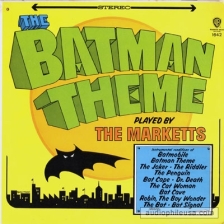 The theme song to the campy TV version of the Caped Crusader story was basically an infectious guitar riff that was part spy movie score and part surf music, with “Batman!” shouted ten times by a female chorus. Neal Hefti wrote the three-chord blues structure and gave it to The Marketts, a popular Hollywood-based surf music combo of the mid-’60s, who had already scored a #3 hit with “Out of Limits,” based on the “Outer Limits” TV series. The “Batman!” song ended up reaching #17 on the Top 40 charts upon its single release in the fall of 1966.
The theme song to the campy TV version of the Caped Crusader story was basically an infectious guitar riff that was part spy movie score and part surf music, with “Batman!” shouted ten times by a female chorus. Neal Hefti wrote the three-chord blues structure and gave it to The Marketts, a popular Hollywood-based surf music combo of the mid-’60s, who had already scored a #3 hit with “Out of Limits,” based on the “Outer Limits” TV series. The “Batman!” song ended up reaching #17 on the Top 40 charts upon its single release in the fall of 1966.
“S.W.A.T.”
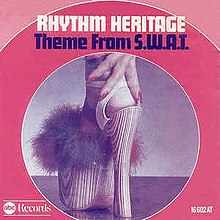 Composer Barry DeVorzon, who also wrote “Nadia’s Theme” for “The Young and the Restless and “Bless the Beasts and the Children” for The Carpenters, wrote “Theme From S.W.A.T.,” a disco song used in the short lived “S.W.A.T.” series in 1976. DeVorzon’s orchestra recorded the short version used during each episode’s opening, but the full length version, recorded by Rhythm Heritage, had a dance arrangement and catapulted to #1 on the Billboard Top 40 chart in late 1976. The song is remembered far more than the series that inspired it.
Composer Barry DeVorzon, who also wrote “Nadia’s Theme” for “The Young and the Restless and “Bless the Beasts and the Children” for The Carpenters, wrote “Theme From S.W.A.T.,” a disco song used in the short lived “S.W.A.T.” series in 1976. DeVorzon’s orchestra recorded the short version used during each episode’s opening, but the full length version, recorded by Rhythm Heritage, had a dance arrangement and catapulted to #1 on the Billboard Top 40 chart in late 1976. The song is remembered far more than the series that inspired it.
“The Rockford Files,” “Hill Street Blues,” “The Greatest American Hero,” “Magnum P.I.”
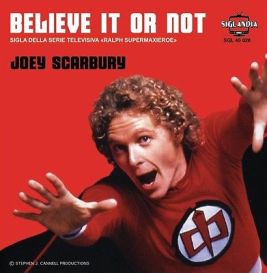 Mike Post is one of the most successful writers of television theme songs, winning multiple Emmys and Grammys for his work over four decades. It’s Mike Post’s music you heard on each episode of “Law and Order,” “Law and Order: SVU,” “NYPD Blue,” “L.A. Law,” “Quantum Leap,” “The A-Team,” “Murder One” and “CHiPs,” among many others. His breakthrough came in 1974 with his “Theme From The Rockford Files,” an instrumental piece that ended up reaching #10 on the Top 40 charts in 1975. In 1981, the music he co-wrote with jazz guitarist Larry Carlton as “Theme From Hill Street Blues” also reached #10 on the Top 40 charts. One of Post’s few theme songs which had lyrics was “Theme From Greatest American Hero (Believe It Or Not),” co-written by Stephen Geyer, which became a #2 hit single in 1981 for one-hit wonder Joey Scarbury (although he later had success as a songwriter on the country music chart). Finally, in 1982, Post’s “Theme from Magnum P.I.” charted at #25 on the Billboard Top 40.
Mike Post is one of the most successful writers of television theme songs, winning multiple Emmys and Grammys for his work over four decades. It’s Mike Post’s music you heard on each episode of “Law and Order,” “Law and Order: SVU,” “NYPD Blue,” “L.A. Law,” “Quantum Leap,” “The A-Team,” “Murder One” and “CHiPs,” among many others. His breakthrough came in 1974 with his “Theme From The Rockford Files,” an instrumental piece that ended up reaching #10 on the Top 40 charts in 1975. In 1981, the music he co-wrote with jazz guitarist Larry Carlton as “Theme From Hill Street Blues” also reached #10 on the Top 40 charts. One of Post’s few theme songs which had lyrics was “Theme From Greatest American Hero (Believe It Or Not),” co-written by Stephen Geyer, which became a #2 hit single in 1981 for one-hit wonder Joey Scarbury (although he later had success as a songwriter on the country music chart). Finally, in 1982, Post’s “Theme from Magnum P.I.” charted at #25 on the Billboard Top 40.
“Makin’ It”
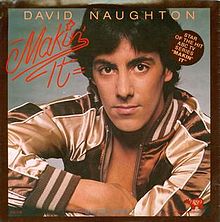 Don’t recognize this TV show? You’re not alone. If you blinked in 1979, you missed it, because it aired for only eight episodes. Created to capitalize on the popularity of the “Saturday Night Fever” film and the disco craze, the show was a victim of poor timing, debuting as the public’s love affair with disco was dissipating. The show starred actor David Naughton, who later starred in the 1981 film “An American Werewolf in London,” and it was also Naughton who sang the show’s disco-based theme song, written by Dino Fekaris and Freddie Perren. Naughton’s recording of “Makin’ It” reached #5 on the Top 40 charts in May 1979, two months after the show’s cancellation.
Don’t recognize this TV show? You’re not alone. If you blinked in 1979, you missed it, because it aired for only eight episodes. Created to capitalize on the popularity of the “Saturday Night Fever” film and the disco craze, the show was a victim of poor timing, debuting as the public’s love affair with disco was dissipating. The show starred actor David Naughton, who later starred in the 1981 film “An American Werewolf in London,” and it was also Naughton who sang the show’s disco-based theme song, written by Dino Fekaris and Freddie Perren. Naughton’s recording of “Makin’ It” reached #5 on the Top 40 charts in May 1979, two months after the show’s cancellation.
****************
“Friends”
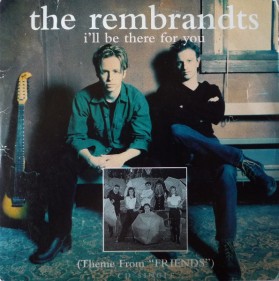 From 1994 to 2004, there was “Friends,” and then there were all the other shows. Wildly popular, the show about six friends based in Manhattan still pulls in a billion bucks a year in syndication residuals. Danny Wilde and Phil Solem, savvy music veterans who had been writing and touring as a duo called The Rembrandts, were signed to write and record a theme song for this new sitcom. In 1995, a Nashville DJ looped the one-minute theme into a longer version and put it on the radio, where it proved so popular that The Rembrandts had to go back into the studio and re-record it as a proper single. “I’ll Be There For You” reached #1 in Canada and #3 in England, and it reached #17 on the US Top 40 that year.
From 1994 to 2004, there was “Friends,” and then there were all the other shows. Wildly popular, the show about six friends based in Manhattan still pulls in a billion bucks a year in syndication residuals. Danny Wilde and Phil Solem, savvy music veterans who had been writing and touring as a duo called The Rembrandts, were signed to write and record a theme song for this new sitcom. In 1995, a Nashville DJ looped the one-minute theme into a longer version and put it on the radio, where it proved so popular that The Rembrandts had to go back into the studio and re-record it as a proper single. “I’ll Be There For You” reached #1 in Canada and #3 in England, and it reached #17 on the US Top 40 that year.
***************
“The Beverly Hillbillies”
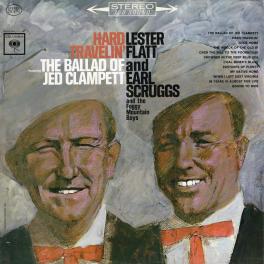 Paul Henning, who also wrote the “Green Acres” theme song, wrote “The Ballad of Jed Clampett,” the theme song that tells the story of how Tennessee hillbillies came to live in a Beverly Hills mansion. Bluegrass musicians Lester Flatt and Earl Scruggs recorded the song, with two verses, for the show opening, with Flatt handling the vocals, then recorded the third verse as a separate bit for the show closing. The single version released to radio, merging the opening and closing lyrics, ended up at #1 for three weeks on the Top Country Hits.
Paul Henning, who also wrote the “Green Acres” theme song, wrote “The Ballad of Jed Clampett,” the theme song that tells the story of how Tennessee hillbillies came to live in a Beverly Hills mansion. Bluegrass musicians Lester Flatt and Earl Scruggs recorded the song, with two verses, for the show opening, with Flatt handling the vocals, then recorded the third verse as a separate bit for the show closing. The single version released to radio, merging the opening and closing lyrics, ended up at #1 for three weeks on the Top Country Hits.
*************
Other notable “honorable mention” theme songs that got radio play:
“Theme from Taxi (Angela),” Bob James, 1978
“Theme From Bonanza,” (1959-1973) Al Caiola & Orchestra, 1961
“Theme From M*A*S*H (Suicide is Painless),” Johnny Mandel and The Mash, 1972
“Theme From Cheers (Where Everybody Knows Your Name),” Gary Portnoy, 1982
I don’t believe it! I just KNEW that Bosom Buddies theme – Billy Joel’s “My Life” would be at the top of your list. How was this NOT #1? Who are ;you? I love you, but who are you? I mean seriously, Billy Joel!!
LikeLike
Well this is interesting! I didn’t watch the show and wasn’t aware they used Billy’s song. This would be in a category a bit different from the ones I selected. In this case, “My Life” was a hit song FIRST (in late 1978) that had nothing to do with “Bosom Buddies” until the producers of the show paid Joel for the rights to use it on their TV series in 1980-81-82. Still, it’s worthy of mention. Thanks for the info!
LikeLike
I love you! I knew you’d do the “research” and get the chronology right. I was pretty sure that the song was pre-Bosom Buddies, but whenever I hear it, I think of the show. You missed a good one – Tom Hanks at his earliest. Thanks!
LikeLiked by 1 person
Dear Bruce,
Great post, as always! I am amazed at how you keep coming up with different topics — TV Theme Songs??!! Spot on.
Mike Post’s contributions are epic. He’s probably the most prolific “catchy tune” composer during that period, but he was already a successful songwriter/composer in the 1960’s, including composing the orchestral arrangements to Mason William’s “Classical Gas” in 1968, and later producing for Kenny Rogers and Van Halen. His epic “Dun-Dun” sound which opens every “Law & Order” show is as iconic as John Williams’ “Daaa-Da!” from “Jaws”. Even The Who honored his abilities with a song in their 2006 album, “Mike Post Themes”.
Your list could have gone on much longer, but let me add a few honorable mentions, theme songs which also hits the music charts: “Bonanza”, “Ben Casey”, “Mission Impossible”, “Wonder Years” (although it was not an original since they borrowed Joe Cocker’s “With a Little Help From My Friends”), “All in the Family” (“Those Were the Days”), “Charlie’s Angels” (OK, who was actually listening to that theme song), “Love Boat” (yup, Jack Jones, 1980…yuck)” and bunches of others.
Even the greatest movie composer deserves credit! The legendary John Williams’ composition of the 1984 “Olympic Fanfare and Overture”, while not technically scored for a regular TV show hit the radio charts, and has proven to have staying power over 30 years later for all broadcast Olympic games. (I am led to believe that his music is also revered among selective prep school social groups — the members of which will NEVER become Supreme Court judges!)
Thanks, Duryea
LikeLiked by 1 person
Wow! That was like a trip back in time!
LikeLike